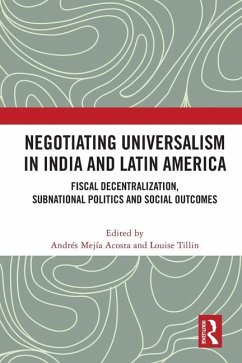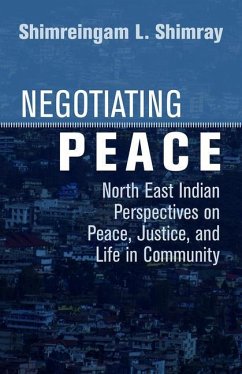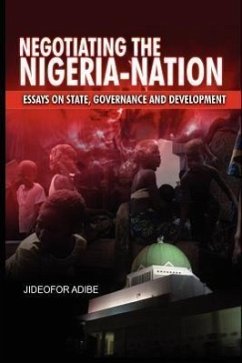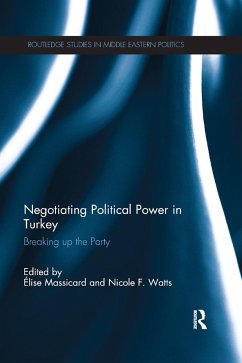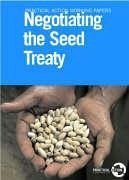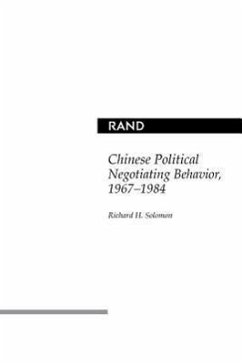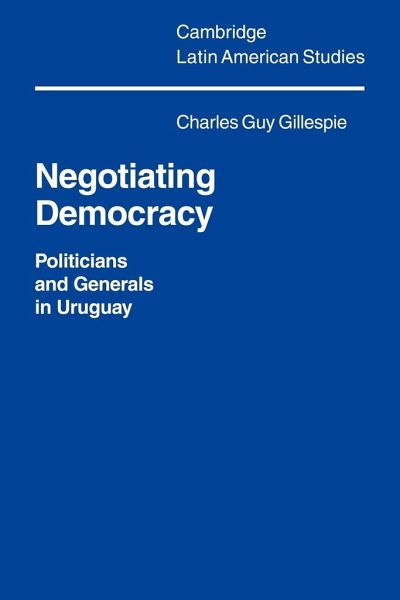
Negotiating Democracy
Politicians and Generals in Uruguay
Herausgeber: Knight, Alan
Versandkostenfrei!
Versandfertig in 1-2 Wochen
43,99 €
inkl. MwSt.

PAYBACK Punkte
22 °P sammeln!
This book discusses how Uruguay was once the most stable democracy in Latin America, but in 1973 the military seized power for the first time.Uruguay was once the most stable democracy in Latin America, but in 1973 the military seized power for the first time. Political parties did not disappear, however, even though they were made illegal. By the 1980s Uruguay's generals were anxious to find a way to withdraw from power. Yet they continued to insist on certain guarantees as the price for holding elections. The issue of whether to make any concessions to the military came to divide the country...
This book discusses how Uruguay was once the most stable democracy in Latin America, but in 1973 the military seized power for the first time.
Uruguay was once the most stable democracy in Latin America, but in 1973 the military seized power for the first time. Political parties did not disappear, however, even though they were made illegal. By the 1980s Uruguay's generals were anxious to find a way to withdraw from power. Yet they continued to insist on certain guarantees as the price for holding elections. The issue of whether to make any concessions to the military came to divide the country's three major parties - the Blancos, the Colorados, and the Left. Nevertheless, the last two parties eventually did agree to a pact in July 1984. The military agreed to return to the barracks and the politicians made an implicit commitment not to prosecute them for their past human rights violations.
Table of contents:
Foreword Juan Linz; Acknowledgments; 1. Introduction: political parties, theories of regime change, and the Uruguayan case; Part I. The Crisis and Survival of Uruguayan Political Parties: 2. Politicians and parties in Uruguay: origins and crisis; 3. The breakdown of democracy; 4. The failure of military institutionalization and political engineering: the survival of political parties; Part II. From Authoritarian Crisis To Transition: 5. Attempts at party renewal: from above and below; 6. Party and military strategies in the 'dialogue': from partial opening to confrontation after the Parque Hotel talks; 7. From mobilization to negotiation: the exhaustion of alternatives; 8. The Naval Club pact: party and military strategies in the transition; Part III. Political Parties and Democratic Consolidation: 9. The competition for support: leadership strategies and electoral behaviour before and after the 1984 electrons; 10. The legacies of authoritarianism and the challenges for democracy; Conclusion; Appendix; Bibliography; Index.
Uruguay was once the most stable democracy in Latin America, but in 1973 the military seized power for the first time. Political parties did not disappear, however, even though they were made illegal. By the 1980s Uruguay's generals were anxious to find a way to withdraw from power. Yet they continued to insist on certain guarantees as the price for holding elections. The issue of whether to make any concessions to the military came to divide the country's three major parties - the Blancos, the Colorados, and the Left. Nevertheless, the last two parties eventually did agree to a pact in July 1984. The military agreed to return to the barracks and the politicians made an implicit commitment not to prosecute them for their past human rights violations.
Table of contents:
Foreword Juan Linz; Acknowledgments; 1. Introduction: political parties, theories of regime change, and the Uruguayan case; Part I. The Crisis and Survival of Uruguayan Political Parties: 2. Politicians and parties in Uruguay: origins and crisis; 3. The breakdown of democracy; 4. The failure of military institutionalization and political engineering: the survival of political parties; Part II. From Authoritarian Crisis To Transition: 5. Attempts at party renewal: from above and below; 6. Party and military strategies in the 'dialogue': from partial opening to confrontation after the Parque Hotel talks; 7. From mobilization to negotiation: the exhaustion of alternatives; 8. The Naval Club pact: party and military strategies in the transition; Part III. Political Parties and Democratic Consolidation: 9. The competition for support: leadership strategies and electoral behaviour before and after the 1984 electrons; 10. The legacies of authoritarianism and the challenges for democracy; Conclusion; Appendix; Bibliography; Index.






